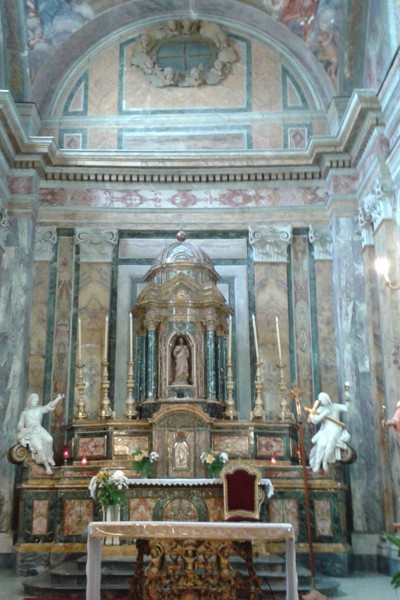Home - In and around
CHURCH OF ST. JOHN THE EVANGELIST BORREMANS
Flemish painter Guglielmo Borremans in Italy, 1670-1744 has frescoed in the eighteenth century the Church of St. John the Evangelist (1615) in Piazza Armerina Enna.
The present structure is the eighteenth-century, it was founded in the fourteenth century. as a church attached to the monastery of the Benedictine.
External access is via two lateral baroque little portals: an input pregievole Cantoria gilded wrought iron.
The eighteenth-century frescoes cover the vaulted roof and the side walls painted by the Dutch artist and his pupils in the first half of the eighteenth century representing the life of the Benedictine saints. Among the main scenes, in time, The Immaculate among the virtues, the Apocalypse of John and the Lives of the main Benedictine saints; in the presbytery, The Adoration of the Shepherds; and on the wall then Epiphany Baptism of Christ; The Crucifixion;
The monastery of the Benedictine nuns of St. John was built in the fourteenth century. at the edge of the village square, it was expanded in the mid-fifteenth century. On that occasion he saw moved its main entrance from the floor of the Holy Father (now off St. John), the street of the Prince (now Via Garibaldi). Subsequently the monastery underwent further interventions up to that achieved after 1860 that gave it its current appearance.
The present structure is the eighteenth-century, it was founded in the fourteenth century. as a church attached to the monastery of the Benedictine.
External access is via two lateral baroque little portals: an input pregievole Cantoria gilded wrought iron.
The eighteenth-century frescoes cover the vaulted roof and the side walls painted by the Dutch artist and his pupils in the first half of the eighteenth century representing the life of the Benedictine saints. Among the main scenes, in time, The Immaculate among the virtues, the Apocalypse of John and the Lives of the main Benedictine saints; in the presbytery, The Adoration of the Shepherds; and on the wall then Epiphany Baptism of Christ; The Crucifixion;
The monastery of the Benedictine nuns of St. John was built in the fourteenth century. at the edge of the village square, it was expanded in the mid-fifteenth century. On that occasion he saw moved its main entrance from the floor of the Holy Father (now off St. John), the street of the Prince (now Via Garibaldi). Subsequently the monastery underwent further interventions up to that achieved after 1860 that gave it its current appearance.



